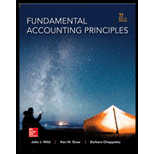
Concept explainers
Concept introduction:
There are 5 types of accounts:
Assets Account:
Liability Accounts:
Equity Accounts:
Revenue:
Expenses:
It means what is owned by the business. The assets may be fixed assets or current assets. The current assets are those which can be easily converted into cash. All assets other than current assets are fixed assets. The fixed assets increase the earning capacity of the business.
It means what the business owes to the outside world. These are the claims against the assets of the company. The liabilities are of two types – long term liabilities and current liabilities. The current liabilities are those which are to be repaid within one year. The long term liabilities are those which are more than a year.
It means owner equity, which may be in form of share capital,
It means the income earned by the business in regular course, it does not include any abnormal profit or income. It is the income earned from the sale of goods and/or services in which the business deals.
These are the expenditures incurred in production, sale and distribution of the goods and/or services in which the business deals.
To provide:
Name of two Asset, liabilities and Equity Accounts.
Explanation of Solution
Asset accounts:
Cash in hand & at bank – The cash available in the cash box and in the bank account of the business. It is the most liquid asset.
Land & Building – The land and premises occupied and owned by the business and is used for carrying out the business activities. It is a fixed asset.
Liability Accounts:
Accounts Payable – These are the amounts due to the suppliers of the business for the purchase of raw materials for the production process.
Outstanding Expenses – It means that we have availed the services of any factor of production but have yet not paid for it. Like outstanding wages.
Equity Accounts:
Capital – It is the amount invested by the owner for the commencement of a new business or for the expansion of the existing business.
Dividend – It is the return given to the owners of the business. It is the share of the capital providers in the profit of the business.
Want to see more full solutions like this?
Chapter 2 Solutions
Fundamental Accounting Principles -Hardcover
- Journal entry for July 1 to record the purchase of Steve Young by Bramble Corporation: A B C D 1 01-07-2025 Cash $51,800 2 Accounts receivable $91,200 3 Inventory $125,700 4 Land $64,600 5 Buildings (net) $75,400 6 Equipment (net) $69,700 7 Trademarks $17,360 8 Goodwill $65,340 9 Accounts payable $202,500 10 Cash $256,600 11 Notes payable $102,000 12 (To record the purchase of Young Company) 13 01-07-2025 Investment in Young compan $358,600 14 Cash $256,600 15 Notes payable $102,000 16 (To record investment in Young Company) (a) prepare the december 31 entry for bramble corporation to record amortization of intangibles. the trademark has an estimated…arrow_forwardJournal entry for July 1 to record the purchase of Steve Young by Bramble Corporation: A B C D 1 01-07-2025 Cash $51,800 2 Accounts receivable $91,200 3 Inventory $125,700 4 Land $64,600 5 Buildings (net) $75,400 6 Equipment (net) $69,700 7 Trademarks $17,360 8 Goodwill $65,340 9 Accounts payable $202,500 10 Cash $256,600 11 Notes payable $102,000 12 (To record the purchase of Young Company) 13 01-07-2025 Investment in Young compan $358,600 14 Cash $256,600 15 Notes payable $102,000 16 (To record investment in Young Company) (a)arrow_forwardI am searching for the correct answer to this general accounting problem with proper accounting rules.arrow_forward
- Please explain the solution to this general accounting problem with accurate explanations.arrow_forwardI am searching for the accurate solution to this general accounting problem with the right approach.arrow_forwardPlease provide the correct answer to this general accounting problem using accurate calculations.arrow_forward

 AccountingAccountingISBN:9781337272094Author:WARREN, Carl S., Reeve, James M., Duchac, Jonathan E.Publisher:Cengage Learning,
AccountingAccountingISBN:9781337272094Author:WARREN, Carl S., Reeve, James M., Duchac, Jonathan E.Publisher:Cengage Learning, Accounting Information SystemsAccountingISBN:9781337619202Author:Hall, James A.Publisher:Cengage Learning,
Accounting Information SystemsAccountingISBN:9781337619202Author:Hall, James A.Publisher:Cengage Learning, Horngren's Cost Accounting: A Managerial Emphasis...AccountingISBN:9780134475585Author:Srikant M. Datar, Madhav V. RajanPublisher:PEARSON
Horngren's Cost Accounting: A Managerial Emphasis...AccountingISBN:9780134475585Author:Srikant M. Datar, Madhav V. RajanPublisher:PEARSON Intermediate AccountingAccountingISBN:9781259722660Author:J. David Spiceland, Mark W. Nelson, Wayne M ThomasPublisher:McGraw-Hill Education
Intermediate AccountingAccountingISBN:9781259722660Author:J. David Spiceland, Mark W. Nelson, Wayne M ThomasPublisher:McGraw-Hill Education Financial and Managerial AccountingAccountingISBN:9781259726705Author:John J Wild, Ken W. Shaw, Barbara Chiappetta Fundamental Accounting PrinciplesPublisher:McGraw-Hill Education
Financial and Managerial AccountingAccountingISBN:9781259726705Author:John J Wild, Ken W. Shaw, Barbara Chiappetta Fundamental Accounting PrinciplesPublisher:McGraw-Hill Education





